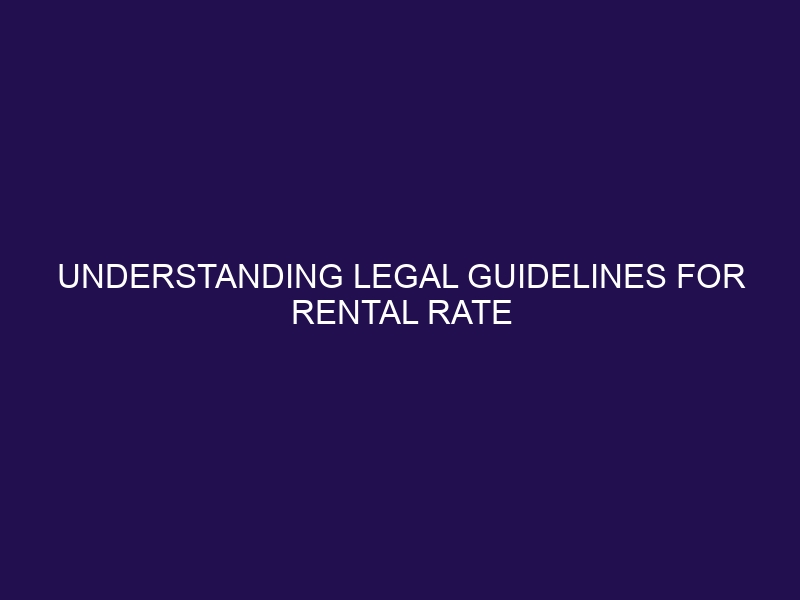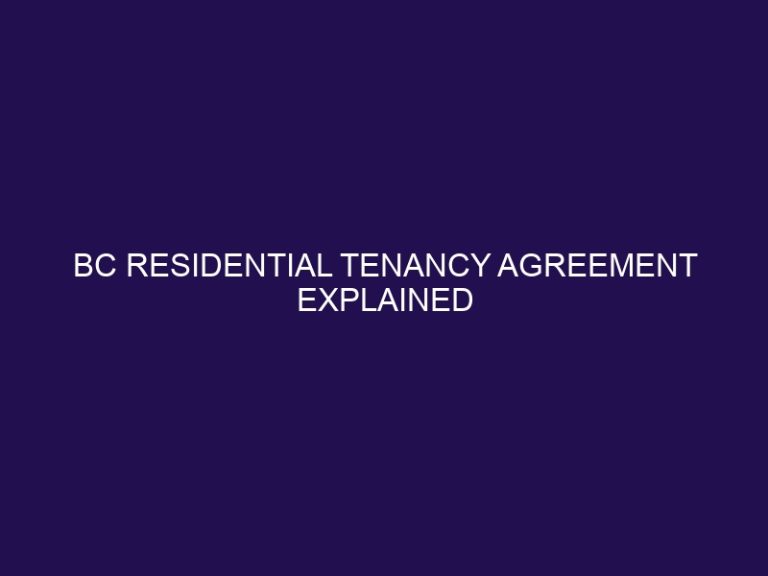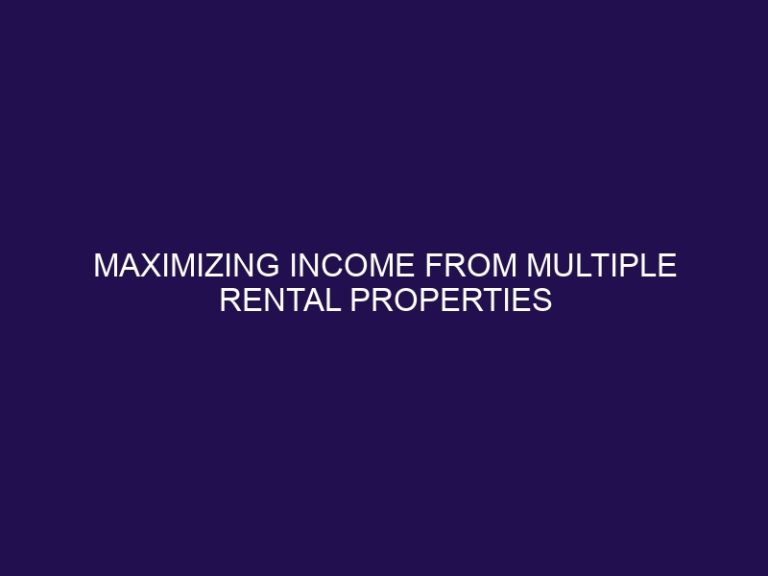Understanding Legal Guidelines for Rental Rate Increases
Rental rate increases refer to the raise in the monthly rent amount for a rental property. This increase is a common occurrence and can happen for various reasons such as inflation, increased property taxes, or higher maintenance costs. It is crucial for both landlords and tenants to understand the legal guidelines that govern rental rate increases to ensure a fair and lawful process.
Landlords may increase rental rates for various reasons, including covering expenses related to the property or to match market rates. However, they must follow certain legal guidelines to avoid violating tenant rights and laws.
The following are some legal guidelines that landlords must consider before increasing rental rates:
- Check Local and State Laws: Both landlords and tenants should be aware of local and state laws that govern rental rate increases. These laws may vary, so it is essential to check for any specific requirements or restrictions in the area.
- Follow Proper Notice Requirements: In most states, landlords are required to provide a written notice to tenants at least 30 days before the proposed rent increase. However, some states may require longer notice periods, so it is essential to check the local laws.
- Consider Rent Control Laws: In cities with rent control laws, landlords may only be allowed to increase rental rates by a certain percentage each year. It is crucial for landlords to understand and comply with these laws to avoid legal consequences.
- Understand Just Cause Eviction Laws: Some states have just cause eviction laws, which require landlords to provide a valid reason for increasing rental rates. These laws aim to protect tenants from arbitrary and unjustified rent increases.
There are different types of rent increases that a landlord may implement, including:
- Fixed Rent Increases: In this type, the landlord increases the rent by a specific amount that remains the same throughout the lease term.
- Percentage-based Rent Increases: In this type, the rent is increased by a percentage of the current rental rate. This is often used to match market rates or to cover increased expenses.
- Capital Improvement Rent Increases: Landlords may increase the rent to cover the cost of significant improvements made to the rental property.
Tenants have the right to respond to rent increases, and here are some ways they can do so:
- Negotiate with the Landlord: Tenants can try to negotiate with the landlord for a lower increase or for more time to adjust to the new rate.
- File a Complaint: If they believe the increase is unlawful or unreasonable, tenants can file a complaint with the local housing authority or tenants’ rights organization.
- Consider Legal Options: In some cases, tenants may have legal recourse, such as breaking the lease or taking legal action, if the landlord’s actions violate their rights.
It is important for both landlords and tenants to understand and follow the legal guidelines for rental rate increases to ensure a fair and lawful process.
What Are Rental Rate Increases?
Rental rate increases refer to the changes made to the amount tenants pay for renting a property. These changes are typically based on factors such as inflation, maintenance costs, or fluctuations in the real estate market.
Why Do Landlords Increase Rental Rates?
Why Do Landlords Increase Rental Rates?
Landlords increase rental rates to keep up with inflation, cover maintenance costs, or respond to increased demand. For example, rising property taxes may lead to rate adjustments.
What Are The Legal Guidelines For Rental Rate Increases?
As a landlord, it is important to understand the legal guidelines for rental rate increases in order to avoid potential legal issues and conflicts with your tenants. In this section, we will discuss the various aspects of rental rate increases that are regulated by local and state laws. From proper notice requirements to considerations of rent control and just cause eviction laws, we will explore the necessary steps to take when raising rental rates. By following these guidelines, you can ensure a fair and legal process for both you and your tenants.
1. Check Local and State Laws
- Research local and state laws on rental rate increases.
- Understand regulations regarding notice requirements.
- Consider any rent control laws in your area.
- Familiarize yourself with just-cause eviction laws.
It’s important to stay informed about rental laws to protect your rights as a tenant. Be sure to check the laws in your state and local area to ensure you are following all regulations regarding rental rates and eviction notices.
2. Follow Proper Notice Requirements
- Review the lease agreement for specific notice period requirements.
- Prepare a written notice complying with the proper notice requirements, as specified by local laws.
- Keep a copy of the notice and any correspondence related to the rent increase.
3. Consider Rent Control Laws
- Research Local Laws: Understand specific rent control regulations in your area.
- Consult Legal Resources: Seek advice from housing authorities, tenant unions, or legal professionals.
- Know Tenant Rights: Familiarize yourself with rights and protections provided by rent control laws.
Facts show that over 180 U.S. cities have some form of rent control, offering tenant protections and affordable housing options. Consider Rent Control Laws to ensure you are well-informed and prepared.
4. Understand Just Cause Eviction Laws
- Review Just Cause Eviction Laws specific to your location.
- Understand the valid reasons for evicting a tenant.
- Comply with legal procedures and documentation required for eviction.
- Gain an understanding of Just Cause Eviction Laws in your area.
What Are The Different Types Of Rent Increases?
In the world of rental properties, landlords may sometimes need to increase the rent in order to keep up with costs and market rates. However, there are various types of rent increases that can be implemented, each with its own set of rules and regulations. In this section, we will discuss the different types of rent increases that landlords can choose from, including fixed rent increases, percentage-based increases, and capital improvement increases. By understanding these options, landlords can make informed decisions when it comes to adjusting rental rates for their properties.
1. Fixed Rent Increases
- Review Lease Agreement: Check for clauses specifying fixed rent increases and make note of them.
- Understand Timing: Determine when the fixed rent increase will go into effect.
- Prepare Budget: Anticipate the impact of the fixed rent increase on your monthly expenses.
2. Percentage-based Rent Increases
- Review Lease Agreement: First, carefully review the lease agreement to understand the terms and conditions for percentage-based rent increases.
- Calculate Percentage Increase: Calculate the percentage increase by finding the difference between the new and old rent, dividing by the old rent, and multiplying by 100.
- Discuss with Landlord: Initiate a discussion with the landlord to negotiate the percentage-based rent increase and explore potential options.
Pro-tip: When discussing the percentage-based rent increase with your landlord, present a clear and well-researched rationale to support your position.
3. Capital Improvement Rent Increases
- Understand the specific capital improvements that justify the increase in rent.
- Review the legal requirements and documentation necessary for implementing the capital improvement rent increase.
- Inform tenants in advance about the planned improvement and the associated adjustment in rent.
How Can Tenants Respond To Rent Increases?
As a tenant, receiving a rent increase notice can be a stressful and overwhelming experience. However, there are several ways you can respond to this situation. In this section, we will discuss the different options available to tenants when faced with a rent increase. From negotiating with the landlord to considering legal action, understanding your rights and knowing how to respond can help alleviate some of the anxiety that comes with a rental rate increase.
1. Negotiate With The Landlord
- Prepare: Collect information on rental rates in the surrounding area.
- Initiate: Arrange a meeting with the landlord to address any concerns.
- Propose: Suggest potential solutions, such as a longer lease period or property upkeep, in exchange for a temporary freeze on rent.
Did you know? In certain scenarios, landlords may be open to negotiating rent based on the tenant’s rental history and the current local market.
2. File A Complaint
- Review Lease Terms: Ensure the proposed increase complies with the lease agreement.
- Document Communication: Keep records of all discussions and correspondence regarding the increase.
- Seek Legal Advice: Consult a tenant’s rights organization or attorney for guidance.
Did you know that in some jurisdictions, tenants have the right to challenge unfair rent increases through a formal complaint process?
3. Consider Legal Options
- Consult a legal professional to understand your rights and options.
- Review the lease agreement for clauses related to rent increases.
- Research tenant rights and protections provided by local laws.
Frequently Asked Questions
What are the state rules for rent increases?
State rules on rent increases vary and can be found in the Nolo article “State Rules on Notice Required to Change or Terminate a Month-to-Month Tenancy.” It is important for tenants to familiarize themselves with these rules to understand their rights and options.
Can landlords give oral notices for rent increases?
No, oral notices are not valid in most states and tenants are not obligated to pay a higher rent unless they agree to it. Landlords must follow specific guidelines and deliver the notice in writing, typically through certified mail.
What happens if a landlord gives improper notice for a rent increase?
If a landlord gives improper notice for a rent increase, tenants have options to respond. They can choose to not pay the increased amount or take legal action if the notice was given for discriminatory or retaliatory reasons.
Can a landlord raise rent during a year-long lease?
In most cases, landlords cannot raise rent during the term of a year-long lease unless there are specific exceptions, such as the lease expiring. Tenants should refer to their lease agreement and state laws for more information.
What should tenants do if they receive a faulty notice for a proposed rent increase?
If tenants receive a faulty notice for a proposed rent increase, they should inform their landlord and request a proper notice following state laws. It is important to keep a record of all communication and document any code violations or faulty notices.
Is a new rental agreement or written amendment required for a rent increase?
Yes, a rent increase should be noted in a new rental agreement or a written amendment to the existing agreement. This ensures that both the tenant and landlord are aware and in agreement of the new rental rate.







